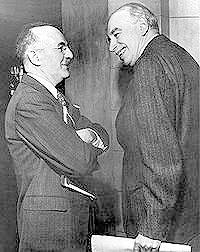The intellectual father of U.S. government monetary policy

Keynes (right) with economist and
senior U.S. Treasury Department
official Harry Dexter White at the
July, 1944 Bretton Woods conference.
From the February 2009 Idaho Observer:
The intellectual father of U.S. government monetary policy

Keynes (right) with economist and
senior U.S. Treasury Department
official Harry Dexter White at the
July, 1944 Bretton Woods conference.
To understand the current economic system requires understanding the economic philosophy of those advancing it. The most profound economic influence on modern economic philosophy/theory is British economist John Maynard Keynes (1883-1946). Keynes believed that a nation’s fiscal solvency begins with the state’s ability to borrow "money" into circulation against a nations’ assets, resources and industry and then control money supply and value through regulatory intervention. Keynes reasoned that this is how governments could mitigate the severity of economic recessions.
Another theory, the Austrian economic model, is Keynes philosophical opposite in that a nation’s wealth begins with its resources and industry and money is coined to facilitate the transaction of goods and services between suppliers and consumers.
In essence, governments prefer the Keynesian model because the money chain begins with government and is, therefore, able to finance its operations to the extent its creditors have faith in the future industry of the people. Conversely, in the Austrian model, the finances of government are limited to the capacity of the people to extract resources, manufacture them into marketable goods and sell them on the open market. The former gives government the authority to borrow itself into colossal debt to finance its relentless growth; the latter limits government finances (and growth) to what it can extract through taxation of its people.
One can safely say that the nearly $11 trillion in U.S. public debt, the incessant wars, the burgeoning police state, the bailout (stimulus) and the fiscal unaccountability of $trillions of dollars and the inevitable collapse of the U.S. economy is the direct result of U.S. government adopting the Keynesian economic model in the 30s (the New Deal) and running with it.
Who was John Maynard Keynes?
Keynes was the son of Cambridge University economics lecturer John Neville Keynes. He was a notorious homosexual until meeting Russian ballerina Lydia Lopokova in 1921, whom he married in 1925. Though their marriage was reportedly "happy," the couple had no children.
Keynes’ most influential work, "The General Theory of Employment, Interest and Money" was published in 1936. Though his work was not generally accepted by American economists at the time, his theories are credited for being the foundation upon which FDR built the second "New Deal" (1935-1938) and have come to be accepted over time as economics student were indoctrinated into Keynesian "macroeconomics" in the nation’s government subsidized universities.
Hindsight shows that the modern era of government growth began with Teddy Roosevelt’s "Square Deal" for the middle and working classes beginning in 1902. Roosevelt created consumer protection agencies, passed child labor and workplace safety laws and also nationalized huge tracts of wilderness to create the federal lands system.
Government as a growth industry got a boost when former banker FDR responded to the banker-created Great Depression by borrowing $millions to finance the creation of government agencies and programs to restart the economy. The welfare system as we know it today was born at this time and many of the federal government’s "New Deal" agencies are still directed by cabinet-level politicians.
Keynes became Lord Baron Keynes in 1942. Also in 1942, Keynes was the leader of the British delegation and chairman of the World Bank Commission where he was instrumental in leading negotiations resulting in the Bretton Woods agreement that created a system of global finance, the World Bank and the International Monetary Fund.
Lord Keynes was a board member of the Cambridge University Eugenics Society in 1945. At the time of his death in 1946, Lord Keynes, an outspoken atheist, had one of the world’s most impressive art collections and viewed eugenics as, "the most important, significant and, I would add, genuine branch of sociology which exists."
Eugenics is the belief that the improvement of hereditary traits comes from reducing the reproduction of certain people with certain (inferior) traits and promoting the reproduction of people with superior genetic traits.
Keynes was survived by his father and his brother, Sir Geoffrey Keynes, an esteemed scholar and surgeon.